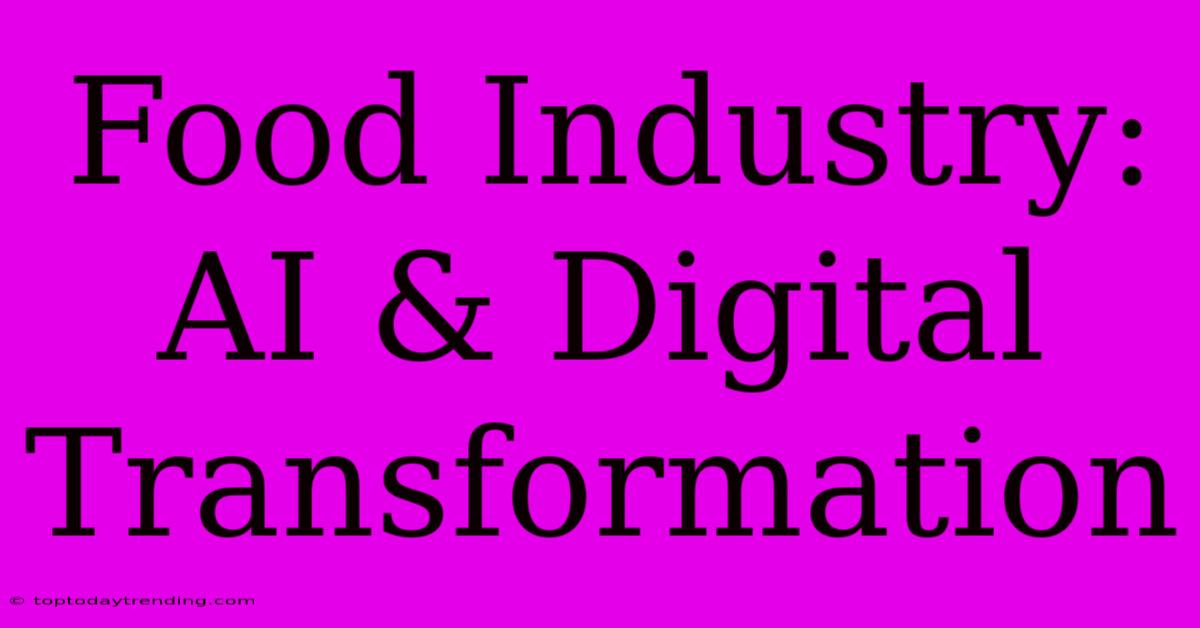The Food Industry: AI & Digital Transformation - A Recipe for Success
The food industry is undergoing a massive transformation, driven by rapidly evolving consumer demands, technological advancements, and a growing need for sustainability. At the forefront of this revolution is the rise of Artificial Intelligence (AI) and digital technologies. These innovations are not just changing the way food is produced, processed, and delivered but are also revolutionizing the entire industry landscape.
AI: From Farm to Fork
AI is impacting every stage of the food supply chain, from farm-to-fork. Here's how:
1. Precision Agriculture: AI-powered sensors and drones are used to collect vast amounts of data about soil conditions, weather patterns, and crop health. This data helps farmers make informed decisions about irrigation, fertilization, and pest control, optimizing yields and reducing waste.
2. Automated Food Processing: AI-powered robots are streamlining production lines in factories, automating tasks such as picking, packing, and quality inspection. This improves efficiency, reduces labor costs, and enhances product consistency.
3. Personalized Food Experiences: AI algorithms analyze consumer data, including purchase history, dietary preferences, and health conditions, to personalize food recommendations and tailor product offerings. This creates a more personalized and engaging customer experience.
4. Food Safety and Traceability: AI-powered systems can track food products throughout the supply chain, ensuring traceability and identifying potential safety issues. This helps prevent outbreaks and build consumer confidence.
Digital Transformation: A Holistic Approach
Beyond AI, other digital technologies are playing a crucial role in transforming the food industry:
1. E-commerce and Online Ordering: The rise of online platforms like Amazon Fresh, Instacart, and DoorDash has transformed how consumers purchase groceries. Food retailers are adapting to these changes by developing online ordering and delivery systems.
2. Digital Marketing and Customer Engagement: Digital marketing channels like social media, content marketing, and targeted advertising are essential for food companies to connect with consumers, build brand loyalty, and drive sales.
3. Data Analytics and Insights: Food companies are leveraging data analytics to gain deeper insights into consumer behavior, market trends, and supply chain efficiency. This helps them make informed decisions about product development, pricing, and marketing strategies.
4. Blockchain Technology: Blockchain can enhance food safety and traceability by creating a secure and tamper-proof record of food products from origin to consumption. This fosters greater trust and transparency within the supply chain.
Challenges and Opportunities
While the potential of AI and digital transformation in the food industry is vast, several challenges need to be addressed:
- Data Privacy and Security: The collection and use of consumer data raise concerns about privacy and security. Companies must implement robust data protection measures.
- Investment and Infrastructure: Implementing AI and digital technologies requires significant investment in infrastructure, training, and expertise.
- Regulation and Compliance: New regulations and standards are needed to govern the use of AI and other emerging technologies in the food industry.
Despite these challenges, the food industry is poised for tremendous growth with the integration of AI and digital technologies. These innovations have the potential to:
- Improve food security and sustainability: By increasing efficiency and reducing waste, AI can contribute to a more sustainable food system.
- Create new opportunities: Digital transformation is creating new jobs and businesses within the food industry.
- Enhance consumer experience: By personalizing experiences and improving food safety, digital technologies are making the food industry more responsive to consumer needs.
Conclusion
The food industry is on the cusp of a significant transformation. AI and digital technologies are not just tools but are becoming essential components of a more efficient, sustainable, and consumer-centric food system. By embracing these innovations, food companies can navigate the challenges and unlock the vast potential of the digital revolution.

